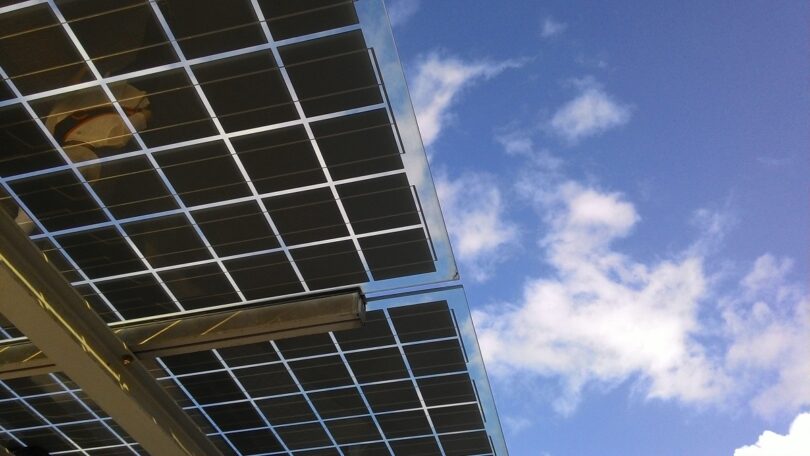In an age where environmental concerns are front and centre and the demand for sustainable energy solutions is growing, businesses are increasingly turning to solar panel installation.
So, let’s explore the advantages and practical aspects of integrating solar panels into your business premises to provide a sustainable solution that not only reduces your carbon footprint, but also brightens your financial future.
Five clear benefits of solar power
Solar power is environmentally friendly, renewable, and abundant energy source. Incorporating solar panels into your business premises offers the following five key benefits:
#1: Reduced energy costs: Solar power significantly reduces your electricity costs, allowing you to spend that money on other aspects of your business.
#2: Tax incentives and rebates: Governments encourage the adoption of solar power, and in many cases they may offer financial incentives such as tax credits and rebates to help cover some of the cost for installing solar panels.
#3: Improved reputation: Going green is not only ethically sound, but also appealing to environmentally conscious consumers and suppliers, which will only help to enhance the reputation of your business.
#4: Reduced carbon footprint: Solar energy is a carbon-neutral power source. Solar doesn’t emit harmful greenhouse gases, meaning it contributes to a cleaner environment.
#5: Generate additional income: Through a practice known as net metering, excess energy generated by your solar panels can be sold back to the grid, providing your business with an additional source of income.
Solar panel installation
So, you are considering solar panels for your business premises. Well, read on to learn what’s involved in installing solar panels at your business premises.
Assessment and planning
Successful solar panel installation begins with a comprehensive assessment of your business’s energy needs and the available space. Factors such as the condition of your roof, its orientation, and shading must be evaluated. Once the assessment is complete, a detailed plan is created outlining the optimal positioning of the panels.
Choosing the right solar panels
Selecting the right solar panels is crucial for the longevity and efficiency and longevity of your solar system. Consider factors such as efficiency, durability, and your budget. There are generally three main types of solar panels to choose from:
• Mono-crystalline panels: Known for their high efficiency, these panels are space-efficient but can be more expensive.
• Poly-crystalline panels: These panels are cost-effective but slightly less efficient than mono-crystalline panels.
• Thin-film panels: Lightweight and flexible, thin-film panels are ideal for specific applications but are less efficient.
Installing your solar panels
Solar panel installment is a three-step process, as follows.
Solar panel placement: Correct placement is vital for maximising energy generation. Solar panels should be oriented to capture the maximum sunlight throughout the day. A professional installer will determine the optimal angle and direction to achieve this.
Inverter installation: Inverters play a critical role in your solar system. They convert the direct current (DC) produced by the solar panels into alternating current (AC), which can be used to power your business operations. Proper installation and maintenance of inverters are essential for optimal performance.
Wiring and connection: An intricate wiring system connects the solar panels and inverters to your business’s electrical system. Ensuring safe, reliable connections is paramount for the system’s functionality and safety.
Solar regulatory and financial requirements
Tax incentives and rebates: Governments at various levels offer tax incentives, rebates, and grants to encourage solar power adoption. These financial benefits can significantly reduce your initial investment, making solar panel installation an even more attractive option.
Net metering: Net metering allows you to sell surplus energy back to the grid, providing an additional source of income for your business. This process not only offsets your energy costs but can potentially earn you money.
The environmental benefits of switching to solar power
Solar panels do not rely on water for cooling, as many traditional power generation methods do. This means that by choosing solar power, your business will contribute to water conservation efforts, another essential aspect of environmental sustainability.
Reducing your carbon footprint: One of the most significant environmental benefits of solar panels is their ability to reduce your carbon footprint. Using solar energy contributes to a cleaner, more sustainable future.
Solar panels and water conservation: Solar panels do not rely on water for cooling, as many traditional power generation methods do. This means that by choosing solar power, your business will contribute to water conservation efforts, another essential aspect of environmental sustainability.
Solar panel maintenance and durability
Routine inspections: Regular inspections are vital to ensure that your solar panel system operates efficiently. These inspections can help detect and address any issues promptly, ensuring that your system remains in top condition.
Extending your solar panel’s lifespan: Proper maintenance, including cleaning the panels and replacing damaged components, can significantly extend the lifespan of your solar panels. This is important for maximising your return on investment.
Measuring success: ROI and energy savings
The ROI for solar panel installations can be substantial. With reduced energy costs, tax incentives, and the potential income from excess energy generation, business owners can enjoy significant long-term savings.
Meeting high energy demands
One of the primary challenges of solar panel installation is the initial investment. However, various financing options, such as solar leases and power purchase agreements (PPAs), make solar power accessible to a wide range of businesses. These options allow you to install solar panels with little to no upfront costs.
Initial solar costs and financing options
One of the primary challenges of solar panel installation is the initial investment. However, various financing options, such as solar leases and power purchase agreements (PPAs), make solar power accessible to a wide range of businesses. These options allow you to install solar panels with little to no upfront costs.
Intermittent power generation
Solar power generation is obviously dependent on sunlight, which can be intermittent due to weather conditions. To ensure a continuous power supply, businesses often use battery storage systems to store excess energy generated during sunny days. These batteries can then be used during cloudy periods or at night, ensuring a consistent energy supply.
Is your business ready to embrace solar power?
Solar panel installation for businesses is a forward-thinking, eco-friendly, and financially sound investment. The environmental, financial, and reputational benefits make it a clear choice for businesses of all sizes. By harnessing the power of the sun, you not only reduce energy costs but also contribute to a brighter, cleaner, and more sustainable future for your business and our planet.
Solar panel FAQs
Q: Is solar panel installation cost-effective for small businesses?
A: Yes, solar panel installation can be a cost-effective solution, with numerous financial incentives available to make it accessible.
Q: How long do solar panels last?
A: Solar panels generally have a lifespan of 25 to 30 years. And with proper maintenance, your solar panels can last even longer.
Q: What happens on cloudy days or at night when solar panels don’t generate energy?
A: To ensure a continuous power supply, businesses often use battery storage systems to store excess energy generated during sunny days.
Q: Can large corporations generate all their energy needs from solar power?
A: While large corporations can meet a significant portion of their energy needs with solar power, they often use a combination of energy sources for reliability.
Q: Are there any ongoing maintenance requirements for solar panels?
A: While large corporations can meet a significant portion of their energy needs with solar power, they often use a combination of energy sources for reliability.







